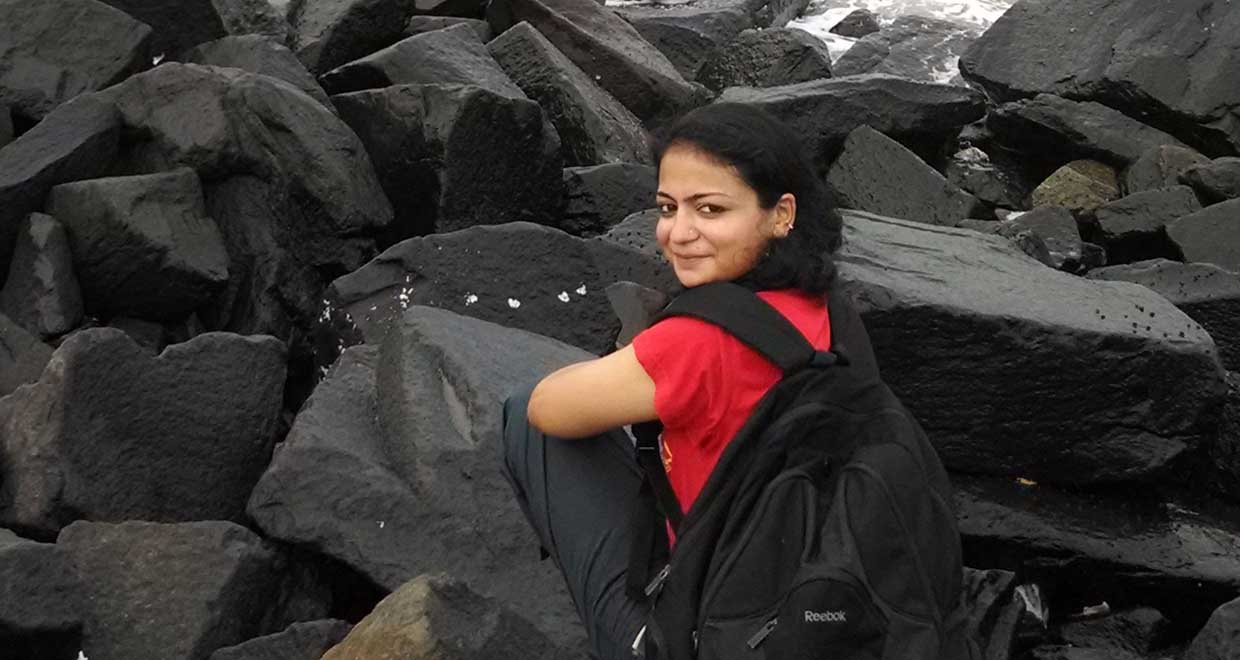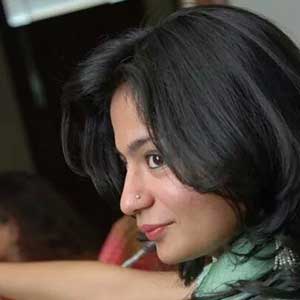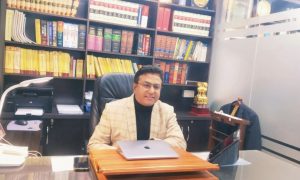Jyotika Jain is a graduate of 2010 batch of Amity Law School. She has publications in renowned journals to her credit and has extensive experience of the Supreme Court & Delhi High Court atmosphere. She is currently working as a Judicial Clerk in Delhi High Court. In this interview we asked her in depth about her experience of working as a judicial clerk under Justice S.K.Mishra, the application procedure and the future prospects of her legal career.
Given that most of our readers belong to legal fraternity, how would you introduce yourself to them?
I am an accidental lawyer. Law had never been one of the options that I had narrowed down to while choosing a career path. I wanted to pursue medicine. After my board exams in class 12th, the next thing I knew was that I was sitting in a class of Law of Contracts.
Legal studies are still only a backup option for quite a lot of students. What motivated you to choose law as a career? How did you get through to Amity Law School?
I never gave law a serious thought. Medicine had always been on my mind. That’s what you would expect in a class with students who have taken Physics, Chemistry, Maths and Biology, as their chosen subject combination. However, one of my batch-mates, did want to pursue Law and she was perhaps the only one. At present, she is pursuing her PhD, and that isn’t remotely in any legal field. Hers and mine is only just an example. There are a lot of students who choose law, and end up in law school. But, I believe ultimately what happens is destiny. No matter how many plans you have in mind, or the amount of preparation you go through, things happen differently.
Coming to Amity Law School, was another chance. I decided to drop a year after 12th so that I could join one of the many coaching institutes and give a good shot at PMT. In the meanwhile, I needed admission in some college as a back-up. I chose Amity over a course in physiotherapy. At the time when I was getting into law school, CLAT had not yet been introduced. Every university had its own entrance examination. I believe that coming from a ‘pure science’ stream, helped me develop an analytical bent of mind. Therefore, without much preparation I was able to clear the GGSIPU’s common entrance test for Law.
What were your areas of interest during your graduation? How did you go about developing expertise and knowledge in these areas?
A lot of decisions that I made through law school, whether for the best or not, were somehow still revolving around science. My favorite subjects were criminal law, mainly due to forensic science, and IPR within which I was fascinated by Patent Law. I always had an interest in these areas, so reading articles or blogs, came as a natural interest. In fact, my dissertation was based on ‘Patenting of Transgenic Animals’. When it came to criminal law and criminology, I just went with my gut and all the information I had absorbed through TV series such as Medical Detectives and Criminal Minds. The key lies in keeping yourself updated. I would never miss out an article with a scientific theme in the newspaper. Somethings just catch your fancy.
In retrospect, things could have been different. The advise that I can give to the next generation of law graduates is; read, read and read. Make a database, make an index for legal areas, and just read a lot. Keep yourself updated with the latest legal principles. You’ll do yourself a favour if you start this exercise now. You’ll find yourself relying on this database very often.
As a law student which activities did you participate in? Did you have any guidance on how to go about your academics, co-curricular activities and internships?
I am a first generation lawyer. Throughout five years of law school, I learnt from observation and from my own mistakes. I didn’t receive any guidance, and I didn’t have anyone’s hand over my head. That hand over your head will make your life much easier throughout law school and later as well. There is no hiding from this fact or being ashamed of it. That’s how it works. At the same time, the other side to this is that, if you don’t have a support system, you can manage fairly well by just working hard. It pays off, and it did in my case.
First year for me was just exploration. It was a new world. So many new faces and a lot more stories about the ‘cool’ seniors we had, who I would say were ‘mooting studs’. Since the very beginning there was this mystical power one would get if they were a mooter, and this is what attracted a lot more people to the arena. My first moot, an internal one, made me cry from the inside, and I ended up with a resolve, not such a firm one, clearly, that I would never moot again. But it was this first moot itself that made me realise that I had a natural gift for research work. As time progressed, I started participating in moot court competitions throughout India, voluntarily choosing to go as a researcher. Believe me.
Around the time I came to third year, I was introduced to Parliamentary Debates (PD). The adrenaline rush in that is much more than moots. In moots you have a lot of time to prepare and furnish your research work. Preparation for PD can never be complete. You can’t know what motion would be thrown at you. The only preparation you can possibly have is, just reading up on current affairs and having bills/propositions prepared before hand, but whether that is used or not is another question. It was this rush, that finally pushed me to go for a moot as the second speaker in my final year at law school.
I never missed a chance on any kind of extra-curricular activities. Moots, Parliamentary Debates, and Essay competitions. One should try for everything. These days there are a lot of colleges that have taken the initiative for letting students present papers at conferences and other events. Which is a good opportunity and one should try and present a paper, or at least try and get two publications.
When it came to academics, I didn’t have a problem. It was as simple as that. I did not shy away from giving my notes to my batch-mates or my juniors. During exams, I was perpetually surrounded by twenty people. Twenty people who had just opened their books hours before the exam. Explaining concepts, and helping them made me revise my course over and over again. Throughout five years, I held the top three ranks in my class. Academics is something I didn’t consider as something that I had to work for. Moots and PDs on the other hand required work and effort. It didn’t take much to recall things from class lectures, or remember case laws. The fact that I could understand legal principles easily can be attributed to my science background, which helped me analyse propositions. As I said before, a lot of what I did revolved around science. Of course, this is not a rule, I am an exception.
What kind of internships did you do while you were a student? Any remarkable experiences during your internships that shaped your career choices later?
One thing that I didn’t skip or compromise on was internships. I didn’t while away time during June and July, the months when we had vacations. June is the worst time to try for litigation internships. Courts are shut. There is hardly any work before the vacation benches, just one or two odd matters.
Looking back, there are two broad areas in which I can divide my experience during internships; Litigation and Research.
I’ll start with the research based ones. The first one was with the National Commission for Women, followed by Centre for Policy Reasearch, where I got the opportunity to work with Dr. Subhash C. Kashyap, on his book on Constitutional Law. After which, I worked with Mr. Shyam Divan, Senior Advocate on the third edition of Environmental Law and Policy in India. This book has been authored by Mr. Divan and Mr. Armin Rosencranz, and is perhaps the only such book available that covers the legal and policy aspects of the environment. In all these three internships, there was a lot to read on legal aspects. Digging and sifting through thousands of precedents, cherry picking applicable areas and then presenting them in a sumarrised form. Although, with Mr. Divan, this wasn’t limited to just precedents, but also covered other literature, where topics related to the environment were being discussed. Imagine in 2009, I’m reading something about vendors on the street, and it is now that the Street Vendors Act got introduced. There were many ancilliary things which were related to the environment that I read about. This helped me build a strong foundation, which helped me later when I interned with the Ministry of Environment and Forests, when Mr. Ramesh was holding charge.
When it comes to litigation, I worked with counsels and in firms. I worked with Mr. Sushil Kumar Jain, who has now been designated as a Senior Advocate and with Mr. Shyam Divan. I went twice to Karanjawala and Co., once in 2010 and before that in 2008, and I also worked with Vaish Associates Advocates.
Ministry of Environment and Forests wouldn’t per se qualify as a litigation based internship, although I did work on some legal briefs there. This was heavily based on policy work and the new amendments that were going to be introduced in the Wild Life Protection Act. It was around this time when the idea for NGT and NEPA was being talked about. There was a lot of interaction with the members of the civil society and also with citizens who had grievances with the proposed amendments. Generally we are used to saying that the government doesn’t really work, but here we went through emails and queries from citizens and also gave them personal hearings. Every day was a different day, and most days had frenzied activity. One of the richest experiences from this internship that I took with me, was working on the Gola Elephant Corridor issue. Having a ground zero and hands on experience with the conflict between man and environment was a very unique experience.
Did you find that your law school education had prepared you sufficiently for the many tasks you were required to execute during your internships?
I believe that what you do in law school and what you do in the field are two entirely different things. Keeping in mind the existing law school curriculum, there isn’t any law school that can prepare you for the world outside. Law school revolves around books, and extra-curricular activities. The life outside these books is another dimension. Well, using research databases such as SCC and Manupatra, is something that you would do in law school and also outside while interning or working. Books would provide a settled principle of law, litigation is on grey areas. Therefore, no law school can prepare you for internships or work. If I could draw an analogy, it is like saying I read Grey’s book on human anatomy and then I performed an autopsy. Practical experience can never come from books.
You have published a lot of papers in various prestigious journals. Can you give us a few tips to ace the art of paper writing?
Art of writing. Well that’s a tough question. You can’t be perfect, there is always something that you can do to make it better. To develop some sort of mastery would require 20-30 years. Writing requires a lot of revision as well. Especially, legal writing, where you can say the same thing in twenty different ways, but the best way would always be the way in which a lay man understands what you are trying to say. Grammar is another area which requires work. I still have a Wren and Marting with me, and a book that tries to explain the usage of punctuation marks on my desk. Understanding rules is one aspect, the other aspect is to read. I stopped reading in between thinking that reading someone else’s work would take away my own unique writing style. I know a lot of people who have gone through this phase. I was wrong. There is a lot you can discover through someone else’s work, and you can learn a lot.
How has your mooting and debating experience been?
Mooting experience, that was a joy ride. As I said, I voluntarily chose to be a researcher mostly, till I chose to finally go as a speaker. All the moots that I participated in, I never got anything back. As a researcher, I could only pass ‘chits’. It was my last moot that changed everything. My team was awarded the prize for the Best International Team in IICLAM. This was also my college’s first ever international trophy. It is something that will always be memorable.
PDs on the other hand, I picked up on faster. It was in my second PD in NLSIU Bangalore, which was organised by Allen and Overy, in which I came runners up in the Novice Championship.
Every student should at least participate in one. There is so much you can learn, and you also get to meet new people during these competitions, people you can learn from as well. Don’t worry about messing it up, or worrying about not getting any awards. The first moot or PD will always be an ice-breaker.
How helpful do you think is mooting for a law student? Does it serve a real purpose or is just another way to crowd up the CV?
Mooting will help you build up on your confidence. It will teach you to not lose your composure when the judge tries to heckle you on a point. I have also judged few moots, and I know why judges try to heckle. They want to see if you break under pressure. It is nothing personal. Most judges heckle those who are good orators. If you are missing the law point, or are fumbling, or don’t understand the question, the judge knows, and they won’t bother with asking you questions and waste time. It’s the good ones whose mettle we try and test.
I don’t think moots should be used to crowd up your CV. You should use it as a means to grow and learn. The purpose it will serve is that it will help you think on your feet, come up with ingenious arguments and at times will also help you in becoming witty.
Currently, you work as a Judicial Clerk at the Chambers of Hon’ble Mr. Justice Sudershan Kumar Misra, High Court at New Delhi. What had contributed towards this appointment?
After law school, I decided to sit for the Civil Services Examination. I believed that having a background in law would help me. I didn’t clear my exam, and I had to start from scratch. I started the process for rebuilding everything. A judicial clerkship is a very good beginning. Although, it is quite unfortunate that in India the value attributed towards this is comparatively quite low as compared to other countries. Even within the legal fraternity here, a clerkship is never viewed as a crowning glory.
One thing that helped me was that even though I have a huge gap on my CV, I still had numerous internships, and extra-curricular activities on it. Getting into law school and sticking to it is not a hard and fast rule. Your life won’t come to an end if you decide to try something else. You should try it, and it is better than living with the regret that ‘I wish I had given this a shot.’ My past work experience and my overall performance in law school helped me immensely.
How did you obtain the Judicial Clerkship? What is the standard procedure to do so?
Every Judge in the High Court and Supreme Court is allowed two law clerks. Generally, one comes through the Registry and the other one is based on the discretion of the Judge. The standard procedure is to go through the Registry.
Did you ever consider a career in the corporate sector? What influenced your decision to work in this sector?
I considered working in the Corporate sector. I don’t have hard and fast notions about careers within the legal field. A lot of decisions depend upon experience and your level of comfort in that field. Ideally, one should try everything, you never know what would click. I haven’t had the chance to work in a corporate environment, so I can’t say much. However, when it comes to litigation, I like the frenzy of the courtrooms and the rush of adrenaline.
What does your current work profile consists of? What is your workday like? Are there new challenges every day or did work fall into a predictable pattern?
Work can be challenging on some days. Employees in the High Court, leave at 5 p.m. Filing counters, Registry etc., shuts in the evening. By 7 p.m. the Court is deserted. But you’ll still have a few Stenographers working, and one or two law clerks that you’ll bump into. I leave when I finish my work. Even though Courts adjourn at 4;30 p.m. there are days when it is not adjourned till seven in the evening. In the evening there are no fixed timings. You’ll leave when you are done for the day. On the other hand, my day at work starts at 9:30 a.m.
Working on the other side, and this is no exaggeration, that at times over 120 matters are assigned to a Judge. The Court timings are from 10:30 a.m. to 4:30 p.m. and in this short period of time, it is not possible to adjudicate upon 120 cases. Judges try their best, and I have seen that. Every person wants a fair amount of time to be heard, and the judges try and give them the time. But honestly, they are just overburdened. We need to at least double the current strength of the High Court Judges. 60 would be a good number to start with.
As a law clerk, one duty which is common to all clerks is to ensure that there are no errors; typographical or grammatical, in the Order or Judgments, before those are given to the Judges. These errors are mostly human errors, which inadvertently creep in when the orders are typed. The court rooms are packed and at times the level of noise is a little high and when the orders are being dictated in the courtroom, some word is missed out by the stenographers. Even a single comma can drastically change the meaning. It is something I have learnt working with Hon’ble Justice Mr. Sudershan Kumar Misra, and he has been a wonderful teacher is this process. His guidance has been invaluable.
Second common task is research work. Your research skills should be very strong, and you’ll sharpen them while working with a judge. The point of law that is being debated upon, is so fine at times, but you need to find something, or be enterprising an ingeneous and try and relate several points together to get to it.
Reading files and making short notes, or as it is called ‘peshis’ is something which other clerks do as well. Making short notes helps you learn how to sift through information and get to the point. Summarising one file into one page is an art and it requires practice.
I don’t think there is a predictable pattern, but yes there are some very slow days at work as well. However, one interesting case will make up for it.
Tell us about your work mantra? What do think are the most essential things required to excel in clerkship?
Everyone has their own personal shortcomings or weak areas. I would only say that you should not shy away from it and work towards improving yourself. My work mantra, or rather mantras would be; work hard, drop your ego, learn how to listen, and always strive towards learning more.
Do you consider pursuing an LL.M abroad? A lot of LL.M aspirants opt for judicial clerkship before higher studies; what is your thought on this?
I would say that if one wishes to pursue an LLM, doing a clerkship is the right thing to do. As I mentioned earlier, in India a clerkship doesn’t hold much value, but for example in USA, a clerkship is viewed as a valuable experience.
What will be your suggestions to our readers who wish to be a judicial clerk?
My suggestion would be that one should seriously consider this as an option. There is a lot you can gain from a clerkship, and these are things that you will realise later. It is a good stepping stone.
What are your future plans?
I wish to continue into litigation. In fact from my batch there are only a handful who chose to be in litigation. Losing possible litigators to easy money is a loss to this field. So, for now my eyes are set here and my feet are firmly planted in the court.

























